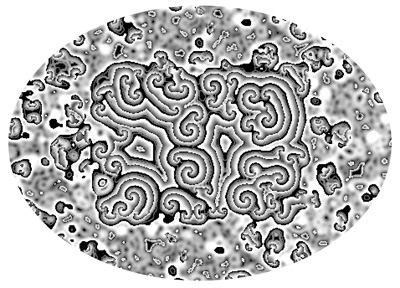Holiday blues setting in already?
No blues here just now, I'm feeling happy, but just to have something to blog, I'm posting a possibly topical excerpt from The Lifebox, the Seashell, and the Soul This quote is (C) Copyright Rudy Rucker, 2004.

At the emotional level, I find it’s interesting to think of my moods in terms of homeostasis. In principle, I would like always to be calm, happy, productive and cheerful. With the accumulation of years of bruising experience, I should by now know to avoid those actions — like yelling at someone — which are sure to have a bad effect on my mood. But my common sense can still be overridden by a conflicting homeostatic drive — such as defending myself against some perceived slight to my self-esteem. It’s striking how easily I’m shunted off into new trajectories. If someone smiles at me, my mood goes up; if the neighbor’s gardener turns on a leaf-blower, my mood drifts down.
My moods continue to vary even when I do manage to be behave optimally and think nice correct thoughts about everything. I might suppose that this is because my moods are affected by other factors — such as diet, sleep, exercise, and biochemical processes I’m not even aware of. But a more computationally realistic explanation is simply that my emotional state is the result of a class four unpredictable computation, and any hope of full control is a dream.
Indeed I sometimes find a bit of serenity by jumping out of the system and really accepting that the flow of my moods is a class four computation akin to the motions of a fluttering leaf. It’s soothing to realize that my computation must inevitably be gnarly and uncontrollable, and looking out the window at the waving branches of trees can be a good reminder.
Buckminster Fuller once wrote a book called I Seem To Be a Verb. His dictum brings out the fact that the individual is a process, an on-going computation. In the same spirit we might say:
I seem to be a fluttering leaf.
One shouldn’t place too high a premium on predictability. After all, the most stable state of all is death. We stay chaotic for as long as we can, postponing that inevitable last output.








